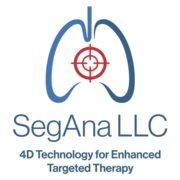SegAna Approved for COVID-19 Fastlane Project Pitch by National Science Foundation
Orlando, Fla. (April 24, 2020) – This week, a study showed nearly 90 percent of COVID-19 patients die after being placed on a ventilator.
An Orlando-based software company may have a solution to improve the effectiveness of the use of a ventilator, often the last effort to keeping people alive in the hospital.
SegAna, based out of the Research Park UCF Innovation District, developed a cloud-based platform and software algorithm to provide real-time tracking of cancerous tumors and the daily changes of the human anatomy. The software, RTapp was recently FDA cleared for use during radiotherapy cancer treatments.
As the COVID-19 pandemic started, SegAna’s team realized their platform could be a solution by quickly using CT scan information to personalize how the ventilator performs.
“Too often, the lungs are damaged in an ICU setting when the ventilator over-pressurizes a patient’s lungs,” says Rodney Bosley, CEO, SegAna. “We foresee that adding personalized control to mechanical ventilators will effectively serve senior citizens and ICU patients in a lifesaving manner.”
The National Science Foundation sees potential in the technology. The organization took the first step toward awarding SegAna a grant by approving their submission for Fastlane status.
This could cut more than four months off the standard approval process for NSF Grants and could bring SegAna up to $1 million in funding for the development of the technology.
The NSF is using it’s grant program as it “seeks to fund the development of leading-edge technology innovations with the potential for substantial impact in responding to the COVID-19 crisis,” the group wrote in its approval to SegAna.
SegAna has had success with grants from the National Science Foundation. Last year, the company was awarded a Phase II grant for $750,000 to help develop artificial intelligence and machine learning applications to allow oncologists to pinpoint radiation onto the tumor, avoiding healthy tissue.
Small businesses can receive up to $1.5 million in funding from NSF. Companies must first have received a Phase I award (up to $225,000) to become eligible to apply for a Phase II grant (up to $750,000) to further develop and commercialize the technology. Small businesses with Phase II grants are eligible to receive up to $500,000 in additional matching funds with qualifying third-party investment or sales.
“The National Science Foundation supports startups and small businesses with the most innovative, cutting-edge ideas that have the potential to become great commercial successes and make huge societal impacts,” Graciela Narcho, Acting Director of the Division of Industrial Innovation and Partnerships at NSF, said at the time of SegAna’s Phase II approval. “We hope that seed funding will spark solutions to some of the most important challenges of our time across all areas of science and technology.”
# # #
For more information media should contact –
SegAna: Tres Riley 817-455-0575 or triley@seganatech.com
UCF Business Incubation Program: Carol Ann Dykes Logue, 407-635-9882, carolann.dykeslogue@ucf.edu or Alan Byrd, Alan Byrd & Associates, 407-415-8470, Alan@ByrdConnections.com
About SegAna: SegAna LLC, Orlando (www.seganatech.com) is a medical device company that has developed a cloud-based software platform utilizing Artificial Intelligence and a proprietary algorithm that measures changes in patient specific tissue elasticity for enhancing radiation treatment of cancer. The company’s product, RTapp, enhances the treatment of cancer by providing the Radiation Oncologist, in any setting or location, with the ability to accurately define the margin of the tumor on the day of treatment and predict an abnormal treatment up to 4 days in the future. The Radiation Oncologist utilizes this information to develop a new patient treatment plan which will ultimately reduce radiation damage to the tissue surrounding the tumor and improve a patient’s outcome. For more information, please visit SegAnaTech.com
About the UCF Business Incubation Program: The University of Central Florida Business Incubation Program is a community resource that provides early-stage companies with the tools, training and infrastructure to become financially stable, high growth/impact enterprises. Since 1999, this award-winning program has helped over 390 local startup companies reach their potential faster by providing vital business development resources.
With seven facilities throughout the region, the UCF Business Incubation Program is an economic development partnership between the University of Central Florida, the Corridor, Orange, Osceola, Seminole and Volusia counties, and the cities of Apopka, Kissimmee, Orlando and Winter Springs. For the 2016/17 and 2017 /18 fiscal years, the activities of these participating firms have helped sustain more than 6,275 local jobs and have had a cumulative impact of more than $888 million on regional GDP and more than $1.59 billion on regional sales. During the same period, the program has returned $12.03 for every $1 invested in the program. For more information, visit Incubator.UCF.edu.
About the National Science Foundation’s Small Business Programs: America’s Seed Fund powered by NSF awards $200 million annually to startups and small businesses, transforming scientific discovery into products and services with commercial and societal impact. Startups working across almost all areas of science and technology can receive up to $1.5 million in non-dilutive funds to support research and development (R&D), helping de-risk technology for commercial success. America’s Seed Fund is congressionally mandated through the Small Business Innovation Research (SBIR) program. The NSF is an independent federal agency with a budget of about $8.1 billion that supports fundamental research and education across all fields of science and engineering. For more information, visit Seedfund.nsf.gov/






